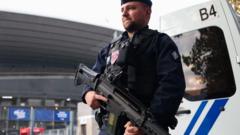In light of violence that erupted in Amsterdam last week, Paris is set to implement an extensive security operation for the forthcoming France-Israel football international scheduled for Thursday. With Maccabi Tel Aviv fans recently targeted in an attack, authorities are increasing police presence significantly, mobilizing approximately 4,000 officers—2,500 stationed at the Stade de France and others distributed around the city and public transport systems.
Paris police chief Laurent Nuñez has classified the match as a “high-risk event,” attributing this designation to the “extremely tense geopolitical context” surrounding it. In addition to law enforcement, around 1,600 private security guards will be on hand at the stadium, complemented by an elite anti-terrorist unit tasked with the protection of the visiting Israeli team. “We will not allow any attempt to disturb public order,” Nuñez reiterated.
The intense scrutiny of the UEFA Nations League encounter is rooted in the violence that occurred following last Thursday’s match between Ajax and Maccabi Tel Aviv in the Netherlands. According to reports, while Maccabi fans engaged in vandalizing a Palestinian flag and other aggressive actions, they were subsequently pursued by groups of rioters in Amsterdam, prompting widespread condemnation of rising antisemitism across Europe.
Given the current socio-political landscape in Europe, where significant Muslim and Jewish communities exist side by side, the potential for unrest related to the match remains high. The attendance of President Macron, Prime Minister Michel Barnier, and former French presidents at the game signals an effort to express solidarity with the Jewish community following traumatic incidents in Amsterdam. Nevertheless, only around 100 Israeli fans are expected to attend, largely due to advisories from the Israeli government.
Supporters at the Stade de France should anticipate identity checks prior to entry, and local establishments near the stadium have been instructed to close in anticipation of potential unrest. The security operation arises amidst a broader backdrop of political dissent; the far-left France Unbowed (LFI) party has called for the match to be canceled, criticizing Macron for honoring Israel. LFI deputy David Guiraud stated, “We do not want our head of state honouring a country that commits genocide,” a claim Israel has vehemently rejected.
Amid these developments, Interior Minister Bruno Retailleau asserted that there would be no cancellations or relocations of the match: “France does not give way to those who sow hatred.” The complexities of Franco-Israeli relations have also become apparent, with recent statements and actions provoking mutual ire. President Macron has faced backlash for his comments regarding Israeli actions in Gaza and Lebanon, while France has expressed dissatisfaction over the detention of its officials in East Jerusalem.
As the match day approaches, activism surrounding the event is growing, with pro-Palestinian demonstrators and anti-racist organizations planning to stage protests reflecting the fierce divide over the situation in the Middle East. Both political leadership and public sentiment remain caught in the crossfire of escalating tensions, raising difficult questions around security and diplomatic relations during an already fraught period.
Paris police chief Laurent Nuñez has classified the match as a “high-risk event,” attributing this designation to the “extremely tense geopolitical context” surrounding it. In addition to law enforcement, around 1,600 private security guards will be on hand at the stadium, complemented by an elite anti-terrorist unit tasked with the protection of the visiting Israeli team. “We will not allow any attempt to disturb public order,” Nuñez reiterated.
The intense scrutiny of the UEFA Nations League encounter is rooted in the violence that occurred following last Thursday’s match between Ajax and Maccabi Tel Aviv in the Netherlands. According to reports, while Maccabi fans engaged in vandalizing a Palestinian flag and other aggressive actions, they were subsequently pursued by groups of rioters in Amsterdam, prompting widespread condemnation of rising antisemitism across Europe.
Given the current socio-political landscape in Europe, where significant Muslim and Jewish communities exist side by side, the potential for unrest related to the match remains high. The attendance of President Macron, Prime Minister Michel Barnier, and former French presidents at the game signals an effort to express solidarity with the Jewish community following traumatic incidents in Amsterdam. Nevertheless, only around 100 Israeli fans are expected to attend, largely due to advisories from the Israeli government.
Supporters at the Stade de France should anticipate identity checks prior to entry, and local establishments near the stadium have been instructed to close in anticipation of potential unrest. The security operation arises amidst a broader backdrop of political dissent; the far-left France Unbowed (LFI) party has called for the match to be canceled, criticizing Macron for honoring Israel. LFI deputy David Guiraud stated, “We do not want our head of state honouring a country that commits genocide,” a claim Israel has vehemently rejected.
Amid these developments, Interior Minister Bruno Retailleau asserted that there would be no cancellations or relocations of the match: “France does not give way to those who sow hatred.” The complexities of Franco-Israeli relations have also become apparent, with recent statements and actions provoking mutual ire. President Macron has faced backlash for his comments regarding Israeli actions in Gaza and Lebanon, while France has expressed dissatisfaction over the detention of its officials in East Jerusalem.
As the match day approaches, activism surrounding the event is growing, with pro-Palestinian demonstrators and anti-racist organizations planning to stage protests reflecting the fierce divide over the situation in the Middle East. Both political leadership and public sentiment remain caught in the crossfire of escalating tensions, raising difficult questions around security and diplomatic relations during an already fraught period.

















